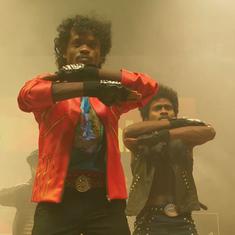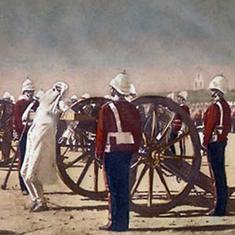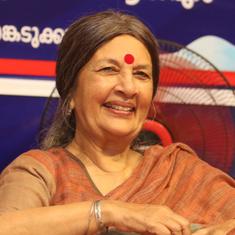Early in 2009, 17 Indian workers in the United Arab Emirates were detained by the police, dumped in jail, and months later, realised that they were on death row for allegedly murdering a Pakistani labourer. The sentence had been pronounced without a fair hearing.
Their story made a few headlines in the Indian media, and then faded out. All of them were young Sikhs from across Punjab. They had to spend four years in UAE prisons before they were deported home, labelled as murder convicts.
But a team of filmmakers, led by journalist Soniya Kirpalani, kept its cameras rolling right up to the end, following the struggle of the men, the desperation of their families, the apathy of the Indian Embassy and messy politics that finally brought the case to its conclusion.
Kirpalani’s documentary film, titled '17 Not Required Indians', had its first public screening at the Mumbai International Film Festival on February 8. It is co-directed by Saurabh Vishwakarma and Insia Dariwala. In 2011, while it was still in the midst of production, the film won the MIPdoc award for documentaries at Cannes, and in 2012, it bagged the IDFA investigative journalism award in Amsterdam.
Kirpalani, who has lived in the UAE for the past 27 years, started asking questions about the case late in 2009 out of basic curiosity: how, she wondered, could 17 people be convicted of killing one man? She wanted to write a story for a news publication, and began doing the rounds of the jails, the courts and the Indian Embassy in Dubai.

(Photo: Ranjeet Kaur, wife of one of the 17 accused)
Her quest eventually led her back to India. “When I visited the families of the accused in Punjab, I realised it was extremely important to tell the stories of these migrants,” said Kirpalani. Of the film she said, "It is not just about these 17. At present, there are more than 1,700 Indians in UAE prisons charged with a variety of crimes; 200 of them are on death row."
These statistics were uncovered in Public Interest Litigation filed by Navkiran Singh, a Chandigarh-based human rights lawyer who was helping the families of the 17 men. His group was the first to start pushing the Indian Embassy in Dubai to appeal for fair trials.
Before that, the Punjabi-speaking men were struggling to understand their situation in jails and courtrooms in which only Arabic was spoken.
“A Pakistani man was killed in a mob fight in Dubai and a few days later, the police randomly arrested me when I was shopping in Sharjah,” said Harjinder Singh, one of the accused men who was detained for ten months before being told of his alleged crime. Singh worked as a driver and had proof that he was en route to Oman when the crime took place. “I called the Indian Embassy thrice in those ten months, begging for help," he said. "They said they would come, but never showed up.” Meanwhile, his family had no idea what had become of him.
In 2010, the Embassy finally appointed lawyers to fight the case in a higher court, but for the first three hearings, it did not provide the men with a translator. Kirpalani’s film reveals recurrent apathy from the Embassy’s defence lawyers – even though they had witnesses and proof that could tilt the decision in favour of the 17 men, they did not file this evidence in court.
“When Navkiran Singh and other human rights lawyers stood up in court and demanded to know why the men were abused in jail, the Embassy said they didn’t want those lawyers involved in the trial,” said Kirpalani.
Eventually, the reason for their thumb-twiddling emerged: SP Oberoi, a Dubai-based businessman and political aspirant, had decided to intervene by invoking the Shariat law of blood money – he had struck a deal with the victim’s family to accept an amount of Rs 8 crore in Pakistani currency in exchange for mercy from the death penalty. The case was dismissed and in 2013, the men were finally sent back to Punjab – labelled for life as guilty.
“At least five of the 17 men had concrete proof of their innocence,” said Kirpalani. “Had there been no political interference, they could have won the case and returned home with dignity.”
Kirpalani’s film, put together mostly through guerrilla shooting, poignantly captures their homecoming in Amritsar. But for the filmmaker, the real story is the trail of exploitation that begins in the offices of the employment agents in India and continues in the inhuman conditions of labour camps in the UAE, where migrants’ passports are taken away by their employers and they are left to struggle without water, electricity, hygiene and often, without salaries.
“I’d like to see the Indian Embassy play a more proactive role in taking care of their migrant citizens overseas,” said Kirpalani.










